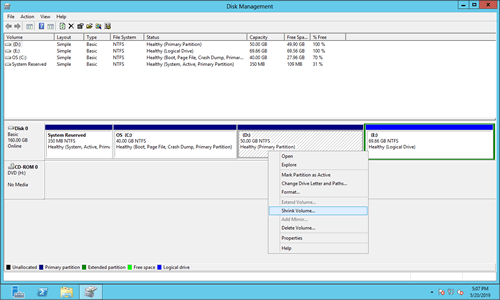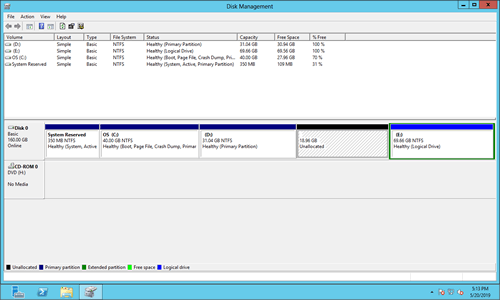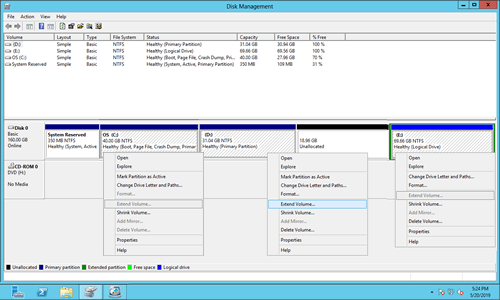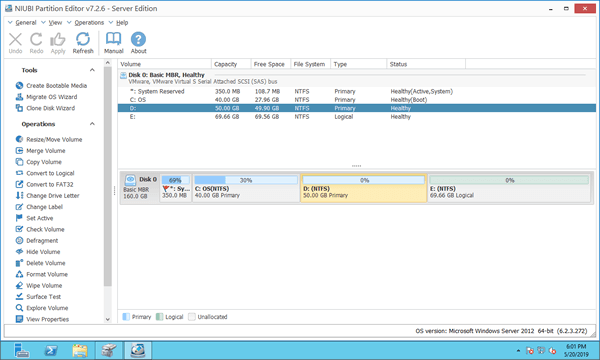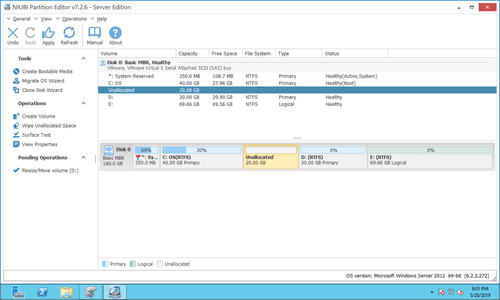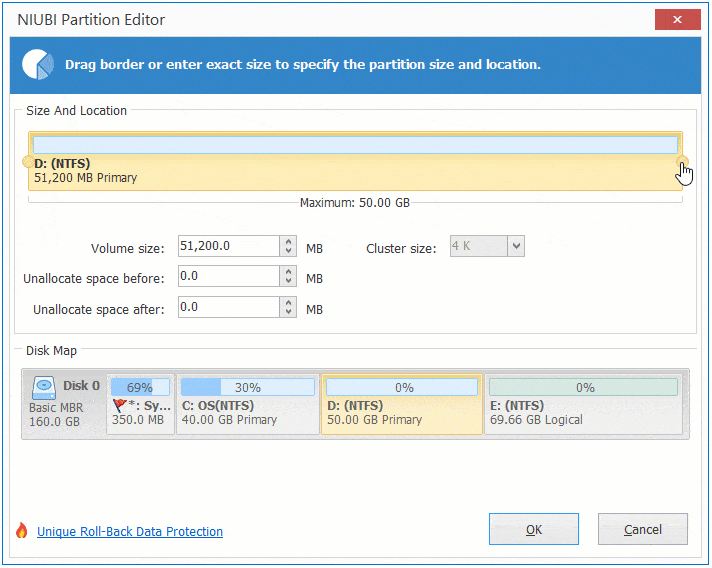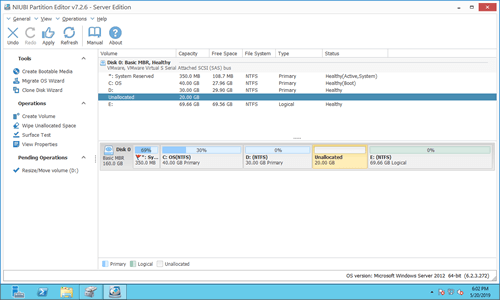Many Windows 2012 server have running for such as long time, one of more partitions may become full. To system and other special partitions, this problem cannot be solved by simply moving files. It can't be better if you can shrink other partition with plenty of free space and move to the partitions that are getting full. In some situation, you need to shrink a large volume to create more partitions for different purpose. This article introduces how to shrink volume in Windows Server 2012/2016/2019/2022 without losing data.
Shrink Volume function in Windows Server
Windows Server 2012 and all subsequent versions have built-in "Shrink Volume" function in Disk Management. It is able to shrink system partition and data volumes without losing data. Better than 3rd-party partition software, it can shrink NTFS partitions without rebooting.
It is very easy to shrink partition in server Disk Management, you just need several clicks. But on the other hand, it is too simple, it can't shrink partition in some situations.
How to shrink volume in Windows Server 2012/2016/2019/2022:
Step 1: Press Windows and X together on the keyboard, then click Disk Management in the list.
Step 3: Enter an amount of space and click "Shrink" in the pop-up window.
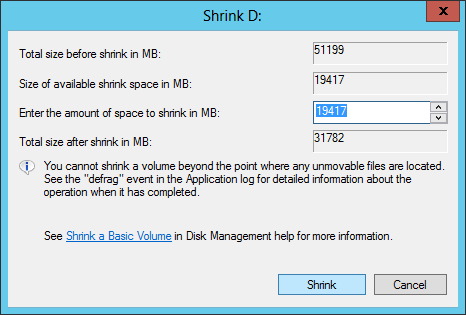
In a short while, partition D is shrank from 50GB to 31.04GB.
The cases can't shrink volume in Windows Server
D drive in my test server is blank, but in the shrinking window, Disk Management gives me only 19417MB (18.96GB) available space, so I can only shrink D drive to 31.04GB.
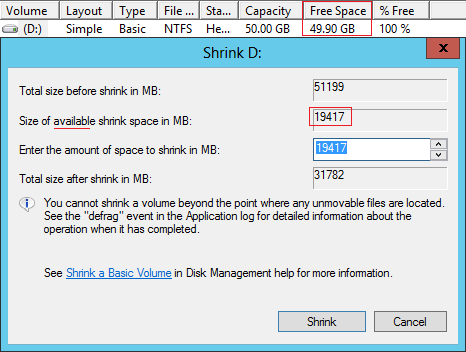
In some server or PC, you can't shrink volume for even 1MB. I've encountered such issue in my Windows 10 computer.
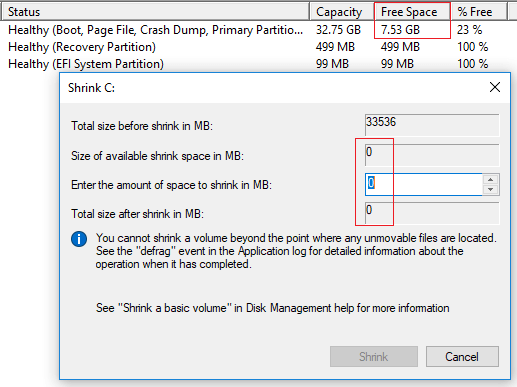
There is a tip in the middle of this shrinking window - "You cannot shrink a volume beyond the point where any unmovable files are located". This is the reason why I cannot shrink D drive to smaller size, because I have Page File in it.
The unmovable files include Paging file, Hibernation and other large files. If any type of unmovable files are located in block 3, you cannot shrink this partition to block 2 or 1, although there is free space there.

Another restriction: Disk Management only support NTFS partition, FAT32 and all other partitions can't be shrank. When you right click these partitions, Shrink Volume is disabled.
Disk Management can't shrink a volume to expand other one
Server 2012 Shrink Volume function can only help you decrease a drive and make unallocated space to create new one. If you want to extend other drive with this unallocated space, it is impossible, although there is another Extend Volume function.
When you shrinking a volume in Server 2012 Disk Management, the only option for you is entering an amount of space, you cannot indicate shrinking to which side.
Disk Management will shrink this partition towards left and make corresponding unallocated space on the right side.
As you see in my test server, Extend Volume is disabled for both C and E drive after shrinking D, because Extend Volume can only combine unallocated space to the left adjacent partition, all other partitions cannot be extended.
With NIUBI Partition Editor, you can shrink a volume towards either side and combine unallocated space to any partition in the same disk.
Shrink volume with partition editor
Download NIUBI Partition Editor and you'll see all disk partitions with structure and other information in the main window.
You just need to drag and drop on the disk map and unallocated space can be make on either side.
How to shrink partition in Windows Server 2012/2016/2019/2022 with NIUBI:
Right click drive D (or other one) and select "Resize/Move Volume".
Option 1: If you drag left border towards right in the pop-up window:
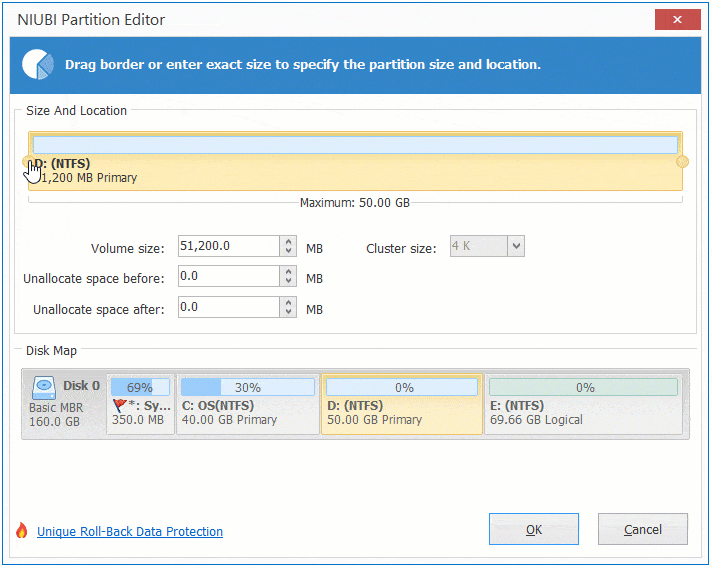
Unallocated space will be made on the left side of D.
Watch the video how to shrink and extend partition on Windows Server 2012 R2:
Comparing with Windows Server inbuilt "Shrink Volume" function, NIUBI Partition Editor has advantages such as:
- It Supports both NTFS and FAT32 partitions.
- Unallocated space can be made on either side.
- It can move "unmovable" files, so it can shrink a volume to minium size if you want.
- Unallocated space can be combined to any contiguous or nonadjacent partitions on the same disk.
Comparing with other disk partition software, NIUBI Partition Editor has unique 1 Second Rollback, Virtual Mode, Cancel-at-will and Hot Clone technologies to protect system and data. Besides shrinking partition in Windows Server 2012/2016/2019/2022, it helps you do many other disk partition management operations.

